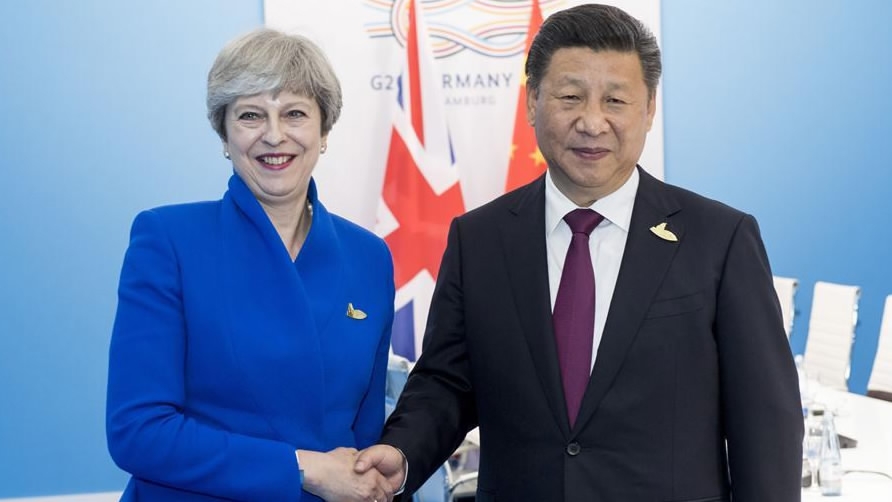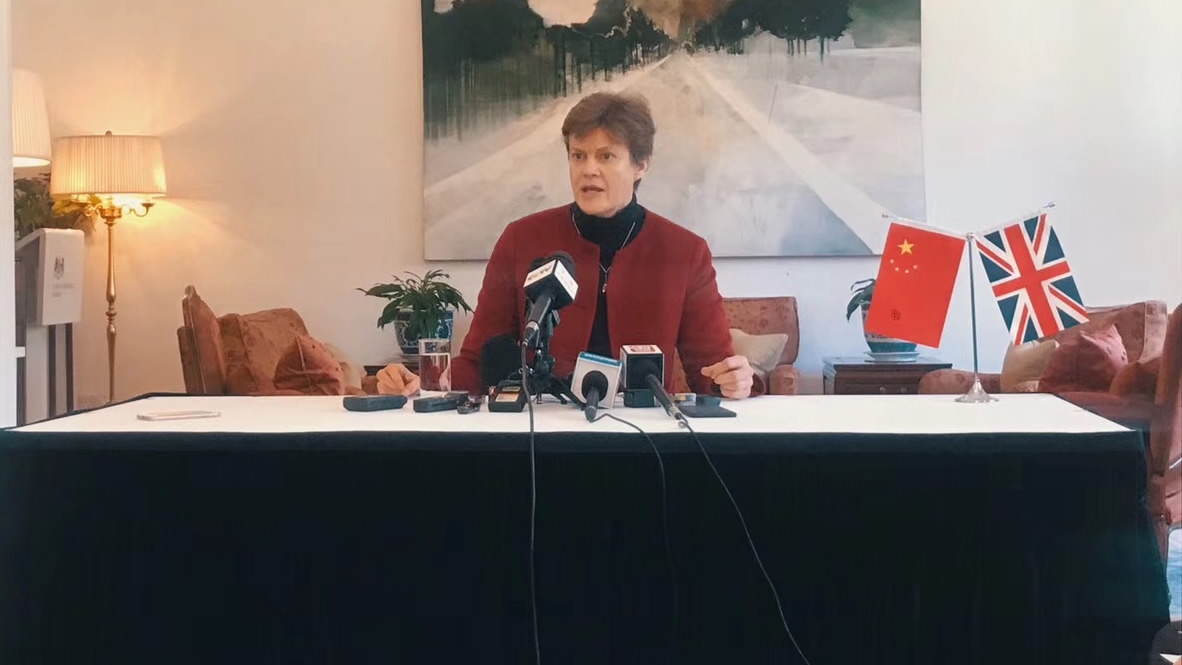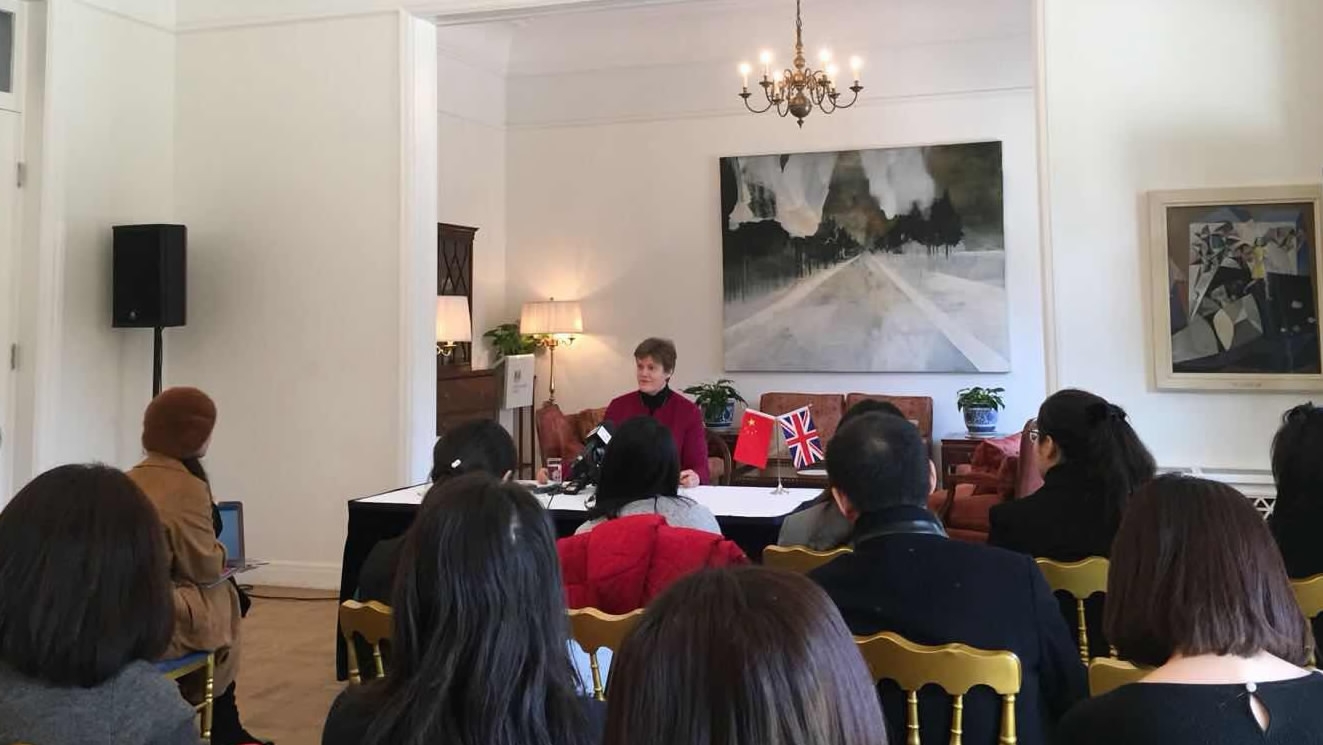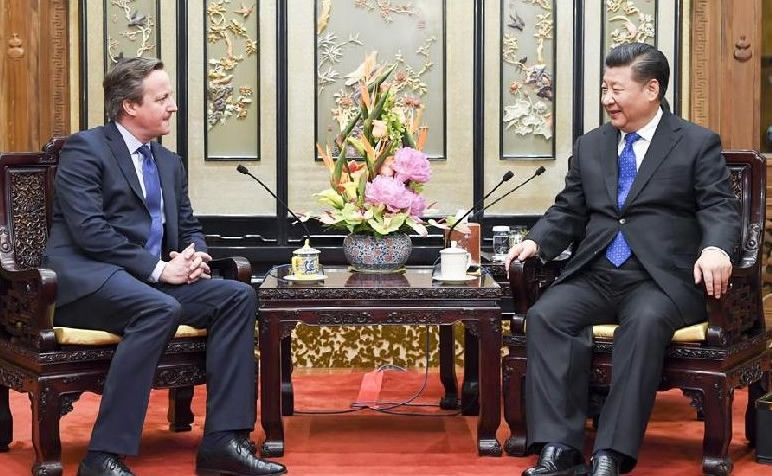
Politics
15:25, 29-Jan-2018
Britain a 'natural partner' on Belt and Road, ambassador insists
By John Goodrich

Britain believes the Belt and Road Initiative (BRI) has "great potential" and sees itself as a "natural partner" in the plan’s development, the European country’s top envoy to China said on Monday.
Speaking at a briefing in Beijing ahead of Prime Minister Theresa May’s upcoming visit, Britain’s Ambassador to China Dame Barbara Woodward said the BRI is "an initiative with great potential, and we want to be a part of it".
Chinese President Xi Jinping called for more mutually beneficial cooperation with Britain under the framework of the BRI when meeting with former Prime Minister David Cameron earlier in January.

British Ambassador to China Dame Barbara Woodward at a press briefing in Beijing on January 29, 2018. /CGTN Photo
British Ambassador to China Dame Barbara Woodward at a press briefing in Beijing on January 29, 2018. /CGTN Photo
Woodward, who made the comments in the wake of UK media speculation over the strength of May's support for the initiative, added that in a fast-changing world Britain’s "commitment to the 'golden era' has remained constant, steadfast and steady."
The term "golden era" was coined ahead of President Xi's state visit to Britain in 2015, when the two countries launched the China-UK global comprehensive strategic partnership for the 21st century.
The ambassador added that Britain had "sought the classic Chinese win-win in the relationship."
China-UK in post-Brexit era
May is due in China on Wednesday for a three-city visit, and will be accompanied by a business delegation made up of both large corporations and small- and medium-sized businesses.
With Britain due to leave the European Union in March 2019 and the terms of departure — as well as the future relationship and a transition period — still up for discussion, maintaining and improving trading relations with the world’s second-largest economy is a key objective for London.

British Ambassador to China Dame Barbara Woodward at a press briefing in Beijing on January 29, 2018. /CGTN Photo
British Ambassador to China Dame Barbara Woodward at a press briefing in Beijing on January 29, 2018. /CGTN Photo
Woodward insisted that Britain is "leaving the EU but remains a global power." She added that operating outside the bloc will have benefits, saying Britain would be "free to make its own decisions on its trade and investment partnerships."
Britain could make faster progress on its relationship with China from outside the bloc in areas such as agriculture, food, medicine, and financial services, Woodward added.
The ambassador outlined three key areas in which Britain aims to cooperate with China:
Trade relations: Bilateral trade was up 30 percent year-on-year, Woodward said, and added there was potential for further growth. She noted that exports from Britain to China had grown by 60 percent since 2010, and emphasized financial services as a key area for cooperation.
Global sustainability: Woodward said that both Britain and China were committed to "building a global economy that is suitable and sustainable," and had already worked together on issues such as green finance, climate change and tackling corruption that underpinned creating a global system that worked for everyone.
Global challenges: Britain and China are working together at the UN to deescalate tensions on the Korean Peninsula, Woodward noted, and would continue to cooperate on global hotspot issues. She identified counter-terrorism, climate change, human trafficking and aviation security as important areas of cooperation.
Belt and Road role
Woodward stressed that Britain was a "natural partner" for the BRI, Xi's proposal to achieve policy, infrastructure, trade, financial and people-to-people connectivity along and beyond the ancient Silk Road trade routes with the aim of boosting cooperation and driving growth.
Britain recently pledged up to 25 billion British pounds in financial support for companies participating in BRI projects in Asia.
The ambassador, who noted that freight trains already transport goods on the 12,000-kilometer journey from China’s Yiwu to London, identified three areas in which Britain could contribute to the BRI: practical collaboration on projects, financial expertise, and ensuring projects meet international standards.

Chinese President Xi Jinping (R) meets with former British Prime Minister David Cameron in Beijing on January 11, 2018. /Xinhua Photo
Chinese President Xi Jinping (R) meets with former British Prime Minister David Cameron in Beijing on January 11, 2018. /Xinhua Photo
Noting that Britain was among the first countries to join the Asian Infrastructure Investment Bank, Woodward emphasized that many of the projects undertaken under the framework of the BRI required complex funding mechanisms, and financial design was an area in which Britain specialized.
Chinese Foreign Ministry spokeswoman Hua Chunying said on Thursday that "China highly values its relations with the UK" and hopes to "step up the political mutual trust and expand across-the-board mutually beneficial cooperation."
May is scheduled to arrive in Beijing on Wednesday, and is also due to visit Shanghai and Wuhan, in the central province of Hubei. Her trip follows recent visits to China by Britain's Chancellor Philip Hammond and International Trade Secretary Liam Fox.
1km

SITEMAP
Copyright © 2018 CGTN. Beijing ICP prepared NO.16065310-3
Copyright © 2018 CGTN. Beijing ICP prepared NO.16065310-3